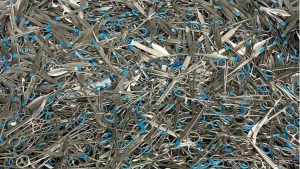Five Tips for Perioperative Team Retention in the Face of a Growing Workforce Shortage
Incision · · 4 min readIf you are a manager in a healthcare organization then chances are, at some point, you will be worried about losing staff. Staff turnover is not only disruptive but can be hugely expensive in terms of time, money and lost expertise. Finding and training the right people is a difficult enough task in the high-stakes, ever-changing world of the operating department; these costs are compounded when employees are lost, creating a logistical nightmare for managers and departments alike.
Everyone wants to avoid high staff turnover rates and the negative consequences this entails. Here are five tips to help retain quality staff in the perioperative environment.
1. Don't skimp on the onboarding program
The onboarding process is more than just an orientation and induction process: it is an opportunity to set the tone for a new employee's working life. Few things are more daunting than feeling underprepared, especially in a new job and especially in a surgical environment. A clear onboarding program allows new employees to get up to speed faster and feel more comfortable and confident in their role.
Unfortunately, induction and onboarding processes often leave a lot to be desired. As a result, errors can be made and, with every error, self-confidence takes a hit. That can lead to underperformance, lack of job satisfaction and — ultimately — can impact employee retention.
2. Assign a buddy
Buddying can be a powerful tool to help new starters settle in and get the most from their induction. It not only helps with the practicalities of getting started but also allows a new employee to start to make connections and contribute to the wider team culture. A good buddy can be a valuable safety net, helping to overcome potential obstacles and supporting personal and professional development.
It is important to select a buddy who will have time to take on the role and won't feel overwhelmed by this additional responsibility. It can be helpful if they are a similar grade to the new employee, or slightly more senior, so that staff can pass on knowledge and transfer experience through the new team.
3. Transparent recruitment
Communicate your team’s vision on themes that are important and relevant for new employees. For many young people, this will be the first time they have had to think seriously about what kind of job they are looking for and where would be the best place to start their career.
Give information about the work-life balance and opportunities for career progression. Be transparent about what the role involves, avoiding jargon and highlighting anything that might be confusing; remember, the last thing you want is to invest in an employee who leaves after a few months of work.
4. Show that you care
Members of the perioperative team need to feel like they can talk about problems or concerns they might have — no matter how small or large these may be. This can be particularly important when it comes to dealing with stress. The operating theatre is an intrinsically stressful environment, where one wrong move can spell disaster. This degree of responsibility will always impact staff in some way. An open-door policy allowing employees to air concerns and frustrations can be extremely beneficial to stop tensions escalating. Tiredness is also a common and hugely damaging factor in hospitals: it is essential that everyone has the time and space needed, both personally and professionally, to rest between shifts.
To keep employees from jumping ship, it is also important to show that you care about their professional development and want to help them achieve career goals. Everyone likes to feel appreciated so show an interest in personal interests and ambitions. What do they like best about their current role? Where do they see themselves next in their professional life? Provide training to allow employees to grow within your hospital and advance as they gain more experience.
5. Provide digital training
Some employees seek out new challenges and additional training and some do not. As a manager, it is hugely important to help your employees develop the knowledge and skills that they both need and want to learn, regardless of their degree of personal motivation. Nowadays, a large part of this involves providing digital learning material so that training is available for everyone without any additional hassle. Actively inquire about what people want to learn and what they perceive as their strengths and weaknesses. Target digital material that benefits both the employee and the department.
Curious about Incision's digital solutions?
Learn more about Incision's high-quality, video-based content or click the button below to download our new Incision Assist Companion App, a process optimization solution that enables the perioperative team to start each day better organized.







